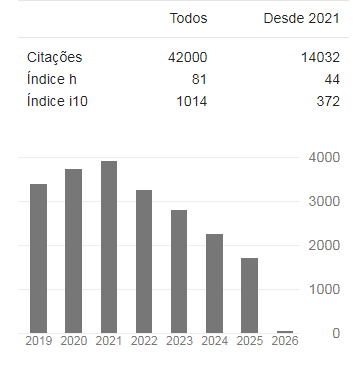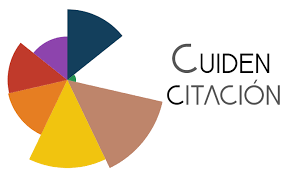Correlation between self-care and social support in people with heart failure
DOI:
https://doi.org/10.35699/2316-9389.2023.40311Keywords:
Self-Care, Heart Failure, NursingAbstract
Objective: to correlate social support with self-care for people with heart failure. Method: an exploratory, descriptive and cross-sectional study with a quantitative approach, carried out with 63 individuals with heart failure treated at a university hospital's Cardiology outpatient clinic. The data were collected using a structured instrument to obtain sociodemographic data and health conditions; the European Heart Failure Self Care Behavior Scale was used to assess self-care, whose final score has an inverted value, indicating that the lower the score, the better the self-care; and the Medical Outcomes Study Social Support Scale, which, through five dimensions (Emotional, Material, Affective, Information and Social Interaction), indicates that the higher the score, the better the social support. Results: in relation to the sample, there was a higher frequency of males (57.14%), aged 60 or over (60.31%), married or in a stable union (65.07%), with five to eight study years (28.57%), unemployed (82.5%) and retired (57.14%). In relation to self-care and social support, satisfactory mean values of 27.01 (±6.66) and 80.27 (±16.48) were obtained, respectively. When investigating the correlation between social support and self-care, a negative correlation (r = -0.252) was identified, with statistical significance (p ≤ 0.05) between the Information dimension and self-care. Conclusion: it is inferred that the social support Information dimension is significantly related to the self-care of people with heart failure, indicating that self-care increases as the Information dimension increases.
Downloads
References
World Health Organization. Noncommunicable Diseases Progress Monitor 2022. Geneva: World Health Organization; 2022[citado em 2022 maio 15]. Disponível em: https://apps.who.int/iris/bitstream/handle/10665/353048/9789240047761-eng.pdf
Brettler JW, Giraldo Arcila GP, Aumala T, Best A, Campbell NRC, Cyr S, et al. Fatores impulsionadores e scorecards para melhorar o controle da hipertensão arterial na atenção primária: recomendações do Grupo de Inovação da Iniciativa HEARTS nas Américas. Rev Panam Salud Publica [Internet]. 2022[citado em 2022 maio 15];46:e68. Disponível em: https://doi.org/10.26633/RPSP.2022.68
Heidenreich PA, Bozkurt B, Aguilar D, Allen LA, Byun JJ, Colvin MM, et al. 2022 AHA/ACC/HFSA guideline for the management of heart failure: a report of the American College of Cardiology / American Heart Association Joint Committee on Clinical Practice Guidelines. Circulation [Internet]. 2022[citado em 2022 maio 15];145:e895–e1032. Disponível em: 10.1161/CIR. 0000000000001063
Agarwal MA, Fonarow GC, Ziaeian B. National trends in heart failure hospitalizations and readmissions from 2010 to 2017. JAMA Cardiol [Internet]. 2021[citado em 2022 maio 15];6:952–6. Disponível em:10.1001/jamacardio.2020.7472
Souza MP, Araújo SM, Dourado MB, Gama GGG. Perfil epidemiológico de idosos com insuficiência cardíaca na unidade de terapia intensiva Rev Enferm Contemp [Internet]. 2017[citado em 2022 maio 15];6(1):42-8. Disponível em: https://doi.org/10.17267/2317-3378rec.v6i1.1164
Lara RAM, Bessa LLC, Silveira AVD, Souza IG, Ferreira GFS, Souza GP, et al. Análise epidemiologia da Insuficiência Cardíaca no Brasil. Braz Med Stud J [Internet]. 2021[citado em 2022 maio 15];6(9). Disponível em: 10.53843/bms.v6i9.224
Xavier SO, Ferretti-Rebustini REL. Características clínicas da Insuficiência Cardíaca associadas à dependência funcional admissional em idosos hospitalizados. Rev Latino-am Enferm [Internet]. 2019[citado em 2022 maio 15];27:e3137. Disponível em: 10.1590/1518-8345.2869-3137
Cavalcante LM, Lima FET, Custódio IL, Oliveira SKP, Meneses LST, Oliveira ASS, et al. Influence of socio-demographic characteristics in the self-care of people with heart failure. Rev Bras Enferm [Internet]. 2018[citado em 2022 maio 15];71(6):2604-11. Disponível em: http://dx.doi.org/10.1590/0034-7167-2017-0480
Sousa MM, Campos RP, Oliveira JS, Oliveira SHS. Adesão de pacientes com Insuficiência Cardíaca à terapêutica instituída. Rev Baiana Enferm [Internet]. 2019 [citado em 2022 maio 20];33. Disponível em: https://periodicos.ufba.br/index.php/enfermagem/article/view/30442
Silva MMBS, Marinho CS, Sampaio ES, Silva RS, Pires CGS, Fraga EN. Qualidade de vida de idosos com Insuficiência Cardíaca. Cienc Enferm [Internet]. 2021[citado em 2022 maio 15];27(8). Disponível em: 10.29393/CE27-8QVMM60008
Santos PA, Ruschel PP, Pfeifer PM. Apoio Social e Coping em Pacientes com Insuficiência Cardíaca. Rev SBPH [Internet]. 2021[citado em 2022 maio 15];24(2):151-62. Disponível em: http://pepsic.bvsalud.org/pdf/rsbph/v24n2/13.pdf
Campelo RC, Silva WC, Batista NJC. Atuação do enfermeiro nas orientações para a prevenção de fatores agravantes na insuficiência cardíaca congestiva: revisão integrativa. Braz J Sug Clin Res [Internet]. 2018[citado em 2022 maio 22];24(2):176-80. Disponível em: https://www.mastereditora.com.br/periodico/20181006_151416.pdf
Bertolucci PHF, Bruchi SMD, Campacci SR, Juliano YO. Mini-Exame do Estado Mental em uma população geral: impacto da escolaridade. Arq Neuropsiquiatr [Internet]. 1994[citado em 2022 maio 15];52(1):01-07. Disponível em: https://doi.org/10.1590/S0004-282X1994000100001
Feijó MK, Ávila CW, Souza EN, Jaarsma T, Rabelo ER. Adaptação transcultural e validação da European Heart Failure Self-care Behavior Scale para o português do Brasil. Rev Latino-am Enferm [Internet]. 2012[citado em 2022 maio 15];20(5):988-96. Disponível em: https://doi.org/10.1590/S0104-11692012000500022
Costa FBS, Gama GGG, Mendes AS. Autocuidado de indivíduos com insuficiência cardíaca. Rev Enferm USFM [Internet]. 2020[citado em 2022 maio 15];10:1-16. Disponível em: 10.5902/2179769240711
Griep RH, Chor D, Faersteom E, Werneck GL, Lopes CS. Validade de constructo de escala de apoio social do Medical Outcomes Study adaptada para o português no Estudo Pró-Saúde. Cad Saúde Pública [Internet]. 2005[citado em 2022 maio 15];21(3):703-14. Disponível em: https://doi.org/10.1590/S0102-311X2005000300004
Lima RJ, Pimenta CJL, Frazão MCLO, Ferreira GRS, Costa TF, Viana LRC, et al. Functional capacity and social support to people affected by cerebrovascular accident. Rev Bras Enferm [Internet]. 2019[citado em 2022 maio 15];72(4):868-73. Disponível em: http://dx.doi.org/10.1590/0034-7167-2017-0854
Rohde LE, Montera MW, Bocchi EA, Clausell N, Albuquerque DC, Rassi S. Diretriz Brasileira de Insuficiência Cardíaca Crônica e Aguda. Diretriz Brasileira de Insuficiência Cardíaca Crônica e Aguda. Arq Bras Cardiol [Internet]. 2018[citado em 2022 maio 15];111(3):436-539. Disponível em: 10.5935/abc.20180190
Tinoco JMVP, Figueiredo LS, Flores PVP, Pádua BLR, Mesquita ET, Cavalcanti ACD. Effectiveness of health education in the self-care and adherence of patients with heart failure: a meta-analysis. Rev Latino-am Enferm [Internet]. 2021[citado em 2022 maio 15];29:e3389. Disponível em: http://dx.doi.org/10.1590/1518-8345.4281.3389
Born MC, Azzolin KO, Souza EN. How long before hospital admission do the symptoms of heart failure decompensation arise? Rev Latino-am Enferm [Internet]. 2019[citado em 2022 maio 15];27:e3119. Disponível em: http://dx.doi.org/10.1590/1518-8345.2735.3119
Additional Files
Published
Issue
Section
License
Copyright (c) 2023 REME-Revista Mineira de Enfermagem

This work is licensed under a Creative Commons Attribution 4.0 International License.





































